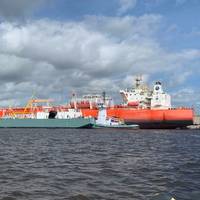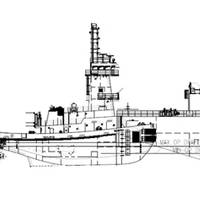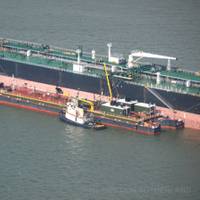Clean Canaveral Completes Inaugural LNG Bunkering

The Clean Canaveral, a new liquefied natural gas (LNG) bunker barge operating along the coast of the southeastern United States, recently completed its inaugural bunkering in Jacksonville, Fla. The Clean Canaveral has a capacity of 5,500 cubic meters, making it the largest Jones Act LNG bunker barge. The vessel operates as an articulated tug barge unit (ATB) and is owned by Polaris New Energy LLC, a subsidiary of Seaside LNG Holdings.The operation marks the first barge-to-ship cool down performed in the United States.
McAllister to Operate ATB for Polaris New Energy LNG Bunkering Ops

McAllister Towing LNG Services, LLC will serve as technical manager for the Polaris New Energy LNG bunkering operation in Florida, operating the Articulated Tug Barge (ATB) Polaris/Clean Canaveral for Polaris New Energy. “We are excited to work with McAllister Towing because, as one of the oldest marine transportation companies in the US, they bring a tradition for providing unsurpassed operational excellence," said Tom Sullivan, COO, Seaside LNG Holdings, the parent company of Polaris New Energy.
New Barges for Short Sea City

The term short-sea shipping comes up aplenty these days, as the powers-that-be rediscover the practicalities and the economies of waterborne transport. The thinking is renewed and the interest revitalized, but for a lot of harbors nationwide it's deja vu. Take the island city of New York, and the multitudes of communities near and far that are joined to it by inland waters—the rivers, sounds, creeks, streams—all the way up to Albany, to Waterford and the Canal system, and to everything beyond that. There's nothing new about the short-sea shipping principle around here.
Double Skin is In
The movement of petroleum products on the nation's rivers, lakes, bays and oceans is soon to be regulated of the Oil Pollution Act of 1990. Called OPA 90, this regulation requires many bulk carriers of petroleum products to use double-hulled barges to haul their cargo by 2005 and all to be doubled hulled by 2015. Looking first at the large product tankers and crude oil carriers, 23 product carriers and 17 crude oil carriers must be double hulled by 2005, another 20 product carriers and 17 crude oil tankers need to be double hulled by 2010 and another 13 product and 9 crude oil ships need to meet OPA 90 by 2015. These conversions (or ship retirements) are a major issue impacting the ability of the U.S. to transport crude oil and its refined products.
Steering into the Future Aboard Lincoln Sea
Everyone knows everyone else's business in this industry, or at least they think they do, and certainly try to. Who owns this or is buying that is information as eagerly sought for tactical insight as it is for gossip, and is equally protected by those in the know. The ex-S/R Everett, lately known as the Lincoln Sea, has been a buzz on New York harbor ever since the newswires hummed with reports that K-Sea had bought the Mobil-built boat. But that was back in January. If it's true, the scuttlebutt asked, how come the winter has passed, the spring has passed, and the boat's still painted blue - not the white superstructure, green decks, tan stacks, and red trim of K-Sea?







